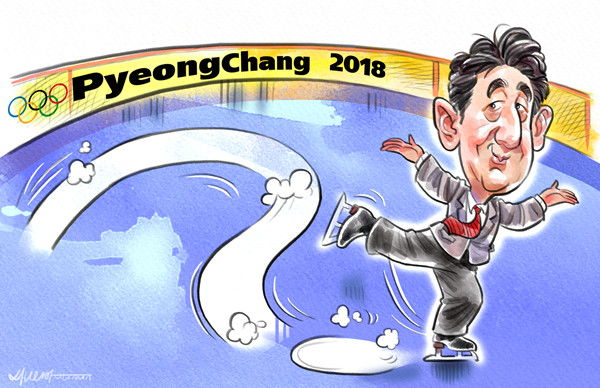Abe counts on Winter Games to polish image
By Shen Haitao | China Daily | Updated: 2018-02-06 07:22

Japanese Prime Minister Shinzo Abe said on Jan 24 that he would attend the opening ceremony of 2018 Winter Olympic Games at Pyeongchang in the Republic of Korea on Feb 9. It was a hard decision for Abe to make, because many in Japan were strongly against the prime minister attending the Winter Games in the ROK.
Disagreements between Tokyo and Seoul on the issue of "comfort women" (women and girls forced into sexual slavery by the Japanese army in occupied territories before and during World War II) was the primary reason why many Japanese were opposed to Abe's visit. Japan expected the agreement with former ROK president Park Geun-hye in 2015 to be the "final and irreversible" solution to the "comfort women" issue, and hoped the ROK would remove the statues of "comfort women" from in front of the Japanese embassy in Seoul.
But ROK President Moon Jae-in, who assumed office in May 2017, claimed that since the agreement did not reflect the victims' needs, Japan needs to do more to settle the issue. Tokyo-Seoul relations turned icy because of the firm stances of both countries.
But by deciding to attend the opening ceremony of the Pyeongchang Winter Olympics, Abe has rekindled hopes of a diplomatic breakthrough, which could start a trend of improving political ties in Northeast Asia. If Abe indeed attends the Winter Games, Japan may get more tourists from the ROK and the ROK government's support for the 2020 Summer Olympic Games in Tokyo.
What will really improve Tokyo-Seoul ties is not Abe's attendance at the Winter Games but the talks between Abe and Moon when the former visits Pyeongchang.
To play an active role in the Korean Peninsula issue and maintain the alliance among the United States, Japan and the ROK, Abe needs a chance to hold talks with Moon and try to break the Tokyo-Seoul diplomatic deadlock.
Moon's efforts to promote inter-Korean talks have upset its allies. The relations between the ROK and the Democratic People's Republic of Korea have improved to a large extent thanks to the talks on Pyongyang's participation in the Pyeongchang Winter Olympics.
This made Japan realize that it had to act, especially after the ROK took the initiative to resolve the Korean Peninsula nuclear issue by engaging the DPRK in talks. Washington, too, has been urging Tokyo to take steps to ease tensions with Seoul, because the US needs to maintain its power balance strategy in Northeast Asia through its alliance with Japan and the ROK.
In fact, Tokyo and Seoul both wanted to improve their relations, even though they differed on the 2015 Japan-ROK pact. That's why Abe accepted the ROK's offer of attending the opening ceremony of the Pyeongchang Winter Games.
Moreover, Abe needs to show more achievements to the Japanese electorate to stabilize his government. And since it is difficult for Abe to convince Moon about the settlement of historical issues, including the "comfort women" issue, because they carry two totally different meanings for peoples in Japan and the ROK, the Japanese prime minister chose sports and cultural matters to improve bilateral ties.
Still, improved Japan-ROK relations will have little effect on the Korean Peninsula issue, which requires joint efforts of many countries to resolve. More importantly, since the ROK can't ignore all the US' demands to ease hostilities with the DPRK, Seoul cannot offer Pyongyang a "real deal" until the latter abandons its nuclear program.
The author is a professor at the Northeast Asian Studies College, Jilin University.
























